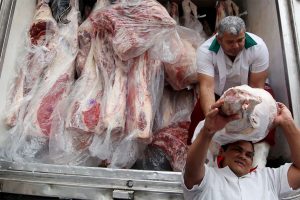MEAT imports dropped 1.56% year on year in the six months to June, lead by weaker pork, beef, and turkey shipments, according to the Bureau of Animal Industry (BAI).
The BAI tallied imports of 590.77 million kilograms of meat during the first half, against 600.14 million kilos a year earlier.
In June, meat imports totaled 112.44 million kilos, down from 122.31 million kilos in May and 139.23 million kilos a year earlier.
Pork accounted for 286.28 million kilos of imports or 48.46% of the total over the first six months. Pork shipments fell 10.97% year on year.
Spain was the primary source country for pork, accounting for 78.55 million kilos, followed by Canada (50.25 million) and Brazil (40.18 million).
Jesus C. Cham, president emeritus of the Meat Importers and Traders Association (MITA), said the volume of imports was coming off a low year-earlier base.
“To put things into context, 2022 still had lockdowns, so the flat performance would indicate that imports are below expectations. This could be attributed perhaps to the carrying over of unsold inventory from the previous year,” he said in a Viber message.
“Additionally, the uncertainty over the duty rates most likely contributed to hedging on imports in the previous year, a scenario which may repeat this year,” he said.
The MITA has asked the government to further lower tariffs to 5% across the board for all meat products and offal.
The current tariff rates are 15% for imports within the minimum access volume (MAV) quota and 25% for those in excess of the quota. These rates are due to expire at the end of 2023. If they revert to their original levels, the rates would become 30% for imports within the quota and 40% for those exceeding the quota.
Beef and turkey imports fell 16.69% to 65.68 million kilos and 58.53% to 112.92 million kilos, respectively.
Higher shipments were recorded for chicken, buffalo, lamb, and duck.
Chicken imports, which accounted for 36% of the total during the six months, hit 212.81 million kilos, up 20.81% from a year earlier.
Some 66.61% or 117.34 million kilos of chicken imports came in the form of mechanically deboned meat (MDM). MDM imports were up 17.12% during the period.
Brazil was the primary source of chicken, accounting for 121.72 million kilos, followed by the US (74.04 million) and Canada (8.11 million).
Buffalo meat shipments rose 9.94% year on year to 25.30 million kilos, while those of lamb rose 46.54% to 422,137 kilos. Duck imports rose by four times to 163,343 kilos.
Brazil accounted for 184.74 million kilos of meat overall, followed by the US (100.13 million), Spain (79.17 million), and Canada (58.89 million). — Sheldeen Joy Talavera

